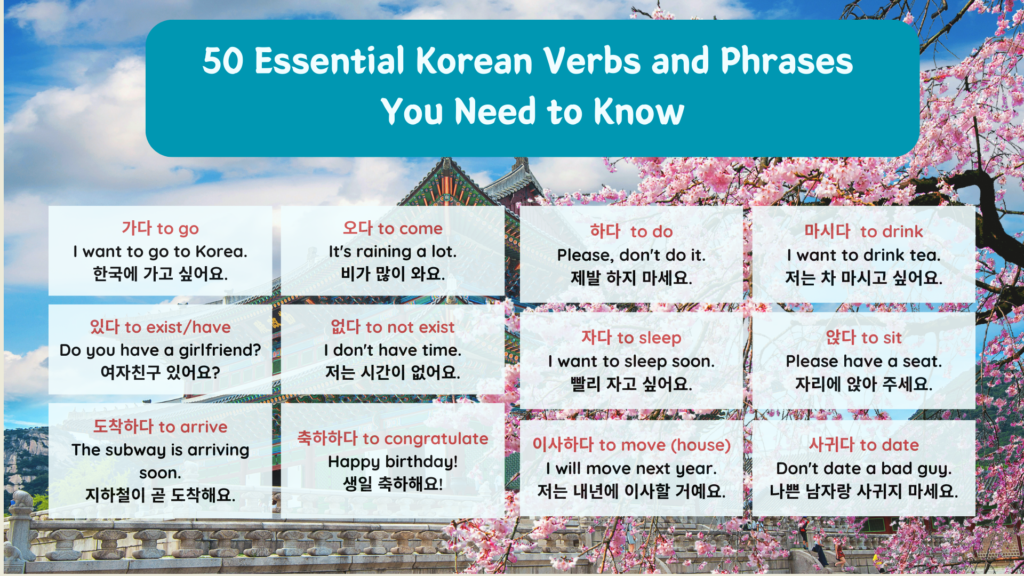
Mastering a language goes beyond memorizing vocabulary; it involves knowing how to use essential verbs and phrases that form the backbone of everyday conversation. In this lesson, we’ve compiled a list of 50 must-know verbs and phrases that will enhance your ability to communicate effectively and confidently in any situation.
Whether you’re just starting out or looking to polish your language skills, these key elements are designed to boost your fluency and help you navigate various interactions with ease. Dive in and discover the tools you need to express yourself clearly and understand others better.
List of Essential Verbs and Phrases

가다 to go
I want to go to Korea.
한국에 가고 싶어요.

오다 to come
It’s raining a lot.
비가 많이 와요.

하다 to do
Please, don’t do it.
제발 하지 마세요.

마시다 to drink
I want to drink tea.
저는 차 마시고 싶어요.

사다 to buy
I will buy a gift for my mom.
엄마를 위해 선물을 살 거예요.

보다 to see/watch/look
I watch the news every day.
저는 매일 뉴스를 봐요.

있다 to exist/have
Do you have a girlfriend?
여자친구 있어요?

없다 to not exist/don’t have
I don’t have time.
저는 시간이 없어요.

자다 to sleep
I want to sleep soon.
빨리 자고 싶어요.

놀다 to play/hang out
We played at the park.
우리는 공원에서 놀았어요.

살다 to live
My grandmother is living (lives) in the countryside.
할머니는 시골에 살고 있어요.

듣다 to listen
Please listen to my story.
제 이야기 좀 들어 주세요.

걷다 to walk
Minsu walked with his girlfriend together.
민수는 여자친구랑 같이 걸었어요.

읽다 to read
I read a book in the library yesterday.
어제 도서관에서 책을 읽었어요.

쓰다 to write/use/wear
Can you write Korean alphabet?
한글을 쓸 수 있어요?

이야기하다 to talk
I want to talk to you on the phone.
전화로 이야기하고 싶어요.

일하다 to work
I don’t want to work tomorrow.
내일은 일 안 하고 싶어요.

공부하다 to study
I can study Korean now.
저는 지금 한국어를 공부할 수 있어요.

운동하다 to exercise
I can exercise well.
저는 운동을 잘 할 수 있어요.

만들다 to make
Can you make furniture?
가구를 만들 수 있어요?

앉다 to sit
Please have a seat.
자리에 앉아 주세요.

연락하다 to contact
We keep in touch often.
우리는 자주 연락해요.

이사하다 to move (house)
I will move next year.
저는 내년에 이사할 거예요.

사귀다 to date
Don’t date a bad guy.
나쁜 남자랑 사귀지 마세요.

버리다 to throw away
Please throw this bottle away.
이 병을 버려주세요.

끊다 to quit / hang up
My dad will quit drinking alcohol.
우리 아빠는 술을 끊을 거예요.

초대하다 to invite
I want to invite my boyfriend to my house.
내 남자친구를 우리집에 초대하고 싶어요.

축하하다 to congratulate
Happy birthday!
생일 축하해요!

도착하다 to arrive
The subway is arriving soon.
지하철이 곧 도착해요.

출발하다 to depart
Please depart when you’re ready.
준비되면 출발해 주세요.

들다 to carry/hold
Please hold my cup.
내 컵 좀 들어 주세요.

물어보다 to ask
Don’t ask about sensitive topics.
민감한 주제에 대해 물어보지 마세요.

되다 to become
I want to be a good person.
좋은 사람이 되고 싶어요.

빌리다 to borrow/rent
I borrowed a book from my friend.
친구한테 책을 빌렸어요.

내리다 to get off
Let me get off here, please.
여기서 내려 주세요.

타다 to ride
I took the bus.
저는 버스를 탔어요.

누르다 to press
I press the button.
버튼을 눌러요.

죽다 to die
My friend’s still alive. He’s not dead.
친구는 아직 살아 있어요. 안 죽었어요.

돕다 to help
My friend helped me yesterday.
친구는 어제 저를 도왔어요.

찾다 to find
Minsu is looking for a new house.
민수는 새로운 집을 찾고 있어요.

잡다 to catch/hold
Mosquitoes are so fast. I can’t catch them.
모기가 너무 빨라요. 잡을 수 없어요.

닫다 to close
Don’t close the door hard.
문을 세게 닫지 마세요.

열다 to open
I won’t open the store tomorrow.
내일 가게를 안 열 거예요.

기다리다 to wait
Don’t wait outside.
밖에서 기다리지 마세요.

자르다 to cut
My mother cut the apple.
어머니는 사과를 잘랐어요.

울다 to buy
Please don’t cry.
제발 울지 마세요.

시작하다 to start
I’ve started a new job.
새로운 일을 시작했어요.

생각하다 to think
Please think about it again.
다시 한번 생각해 주세요.
Want to learn more?




NEW BOOK: Korean’s Top 100 Verbs in Everyday Conversation
Learn essential Korean verbs and patterns with 1,000 examples and 500 vivid sentences, enhancing your proficiency in contemporary, everyday Korean conversation.
Our book features highlighted new vocabulary in every sample sentence, providing the most efficient way to study vocab, grammar, and phrases simultaneously.

Building a strong foundation in any language begins with mastering its most essential components. The 50 verbs and phrases covered in this guide are not just useful; they are vital for effective communication. By incorporating these key elements into your daily practice, you will find yourself better equipped to handle a wide range of conversations, from casual chats to more formal interactions. Remember, fluency comes with time and consistent practice. Keep using these verbs and phrases, and soon you’ll notice a significant improvement in your language skills. Thank you for reading, and happy learning!
Table of Contents

